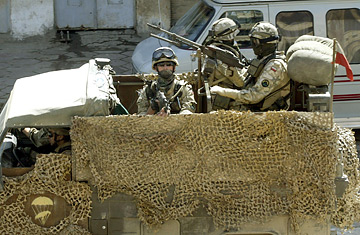
Polish soldiers patrol Samawa in southern Iraq.
The death of a Polish soldier in the southern city of Diwaniyah Friday was a reminder that militants will still find ways to strike — and that Americans aren't their only targets.
Senior Cpl. Andrzej Filipek, a 31-year-old father of two who was just beginning his third tour with the Polish force in Southern Iraq, was killed by a powerful roadside bomb Friday morning near a joint Iraqi-Polish outpost in this tumultuous city deep in Iraq's Shi'ite heartland. He was the 22nd Polish soldier to die in Iraq since the autumn of 2003, when Poland first sent troops into the country. He was the first Pole killed in action in more than six months and his death comes at a delicate time for a newly elected Polish government, which is under intense domestic pressure to pull out all its people of Iraq by next year. After the British force, which recently pulled out of Basra, the 900-strong Polish unit is the largest international contingent serving with the U.S. in Iraq.
"The Poles have been serving down here on a year-by-year basis, and some in the new government aren't too sure they want to stick around," said Army Col. Dave Leckrone, the senior American commander in southern Iraq. "Things like today's attack don't make things any easier. Things like the ambassador getting attacked don't make it any easier, either," he said, referring to the recent ambush of the Polish ambassador's motorcade in Baghdad, which killed a member of his security detail and wounded the ambassador and three others. Military officials said they believed that attack was the work of a Shi'ite militant group known as the Battalions of Hussein, a splinter group of radical Shi'ite cleric Moqtada al Sadr's Mahdi Army. The same group made life difficult for British Forces in Basra and has recently shown up in Diwaniyah, claiming responsibility for mortar and rocket attacks and dropping leaflets in neighborhoods surrounding two joint Polish-Iraqi outposts, warning residents to flee coming attacks.
The militants' tactics in Diwaniyah would be familiar to the British. After months of sustained mortar and rocket attacks on their Basra camps, the British essentially declared victory and slipped out of Basra in the night, pulling back to the regional airport and washing their hands of the Shi'ite infighting that has made Iraq's second largest city ungovernable. British Defense Secretary Des Browne announced Wednesday in Baghdad that the British would hand the Basra region over to Iraqi security forces by mid-December, leaving the city to Iraqi forces that are deeply infiltrated by three warring Shi'ite factions.
Emboldened by a propaganda victory when the British left Basra, Shi'ite militants have since turned their sights on the Poles and the patchwork of other international forces stationed in and around Diwaniyah. Camp Echo, the headquarters of Multinational Division Central-South, is a virtual Tower of Babel where more than 200 Americans and most of the 900-strong Polish force work and live alongside 100 Mongolians, 62 Romanians, 46 Armenians, 36 Bosnians, 27 Ukrainians, a Lithuanian, a Latvian and a bunch of Ugandan guards. Together they and their numbers posted in urban outposts endure frequent mortar and rocket attacks. Between June and July they were hit with at least 350 rockets and mortar shells, Leckrone said.
Polish commanders say more aggressive patrolling, targeted raids and more robust civil affair missions and infrastructure projects have dented the militants' ability to mount such attacks in recent months, but Diwaniyah is still a dangerous place for foreign troops. During an emotional Catholic Mass Friday night after Cpl. Filipek's death, Maj. Gen. Tadeusz Buk, the commander of all Polish forces in Iraq, called for the Coalition troops in Diwaniyah to rally together in their time of grief. "Please, let me ask you to get even more united, even more strong, so that this sacrifice is not a waste," he said to a crowd of about 75 stern-faced soldiers packed into a tiny chapel heavy with the weight of the day. "We need to proceed in the memory of our great hero," he said.
Leckrone, the American commander, said that with the British out of Basra, and U.S. and Coalition forces withdrawing from Karbala last week, Shi'ite militias in southern Iraq may now focus on Diwaniyah. "There's been, no doubt, a lot of progress lately," he said. "But it's still an uphill battle here, a tough fight. You never know where or when they [the militia] are going to pop up."
